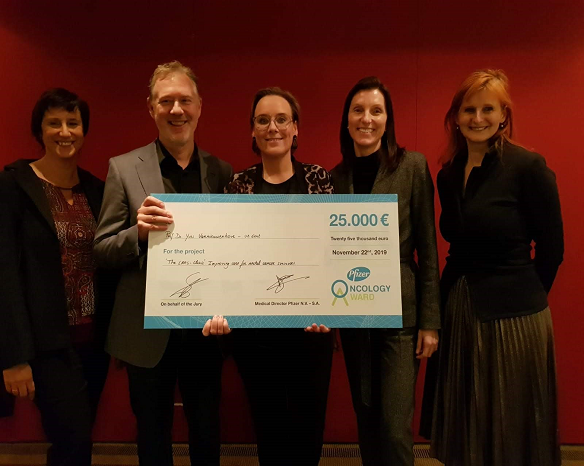Pfizer Oncology Award
During the 13th BSMO-Bordet meeting on November 22-23th 2019, professor Yves Van Nieuwenhove and Mrs. Eva Pape (University Hospital Ghent) have been awarded with the yearly Pfizer Oncology Award. This award supports, recognises and encourages one innovative project in Belgium or Luxembourg that improves the quality and/or availability of patient care in oncology and is worth 25,000 euro. Projects addressing the clinical, surgical, medical or technical aspects of patient care as well as the different ways of collaboration and organisation between various health care providers or different levels of care during the course of the disease are eligible. The winning project was selected out of nineteen submissions by an independent scientific committee, chaired by professor Sylvie Rottey and composed of medical oncologists, haematologists and onco-nurse representatives. The winning project from the group of professor Van Nieuwenhove aims at developing a LARS-clinic to improve care for rectal cancer survivors in order to manage the struggle of patients dealing with the low anterior resection syndrome .

Mrs Eva Pape (center) and prof. Yves Van Nieuwenhove receive the Pfizer Oncology Award from prof. Sylvie Rottey (Chairman of the Scientific Committee) and Pfizer delegates.
Low Anterior Resection Syndrome
Due to significantly improved surgical techniques and radiotherapy, surgeons are nowadays often able to perform more sphincter-saving procedures. With this technique, a permanent stoma can be avoided. Patients often perceive the removal of the temporary stoma as the end of a long treatment trajectory and a return to their life prior to the cancer diagnosis. Unfortunately, the majority of patients (69%) is confronted with a major low anterior resection syndrome (LARS), a serious change in bowel movements that is characterised by frequent toilet visits, clustering, urgency and incontinence.1,2 The lives of patients with LARS, as well as that of their partners and other informal caregivers, can be dominated by this altered bowel function and LARS can lead to a significant reduction in the quality of life.
In a first phase of the project (supported by a grant from Kom Op Tegen Kanker), the needs of patients with LARS and their informal caregivers were explored in more detail. In addition, focus group interviews with professional caregivers were performed in order to get a clear view on what they would need to optimally inform and guide their patients.2
Development of a nurse-led LARS clinic
With her doctoral research Mrs. Eva Pape (clinical nurse specialist digestive oncology and PhD student under supervision of prof. Van Nieuwenhove) aims to improve the care for rectal cancer survivors who are struggling with the LARS. To this end a LARS-clinic will be set up. This nurse-led clinic will focus on the counselling of late term effects after rectal cancer surgery and the optimisation of education and information for patients and their informal caregivers. Finally, her work aims to develop a treatment algorithm in consensus with healthcare providers and patients in order to avoid a ‘trial and error’- approach. As there is no LARS-clinic yet in Belgium, Mrs. Pape recently travelled to the St Marks Hospital (London, United Kingdom), specialised in intestinal and colorectal disorders, to learn more on the implementation of their LARS-clinic. In Belgium, the project will initially be implemented in four hospitals; University Hospital Ghent (Ghent), AZ Sint-Lukas (Ghent), AZ Sint-Jan (Bruges) and AZ Delta (Roeselare). Once the implementation of the LARS-clinic has been evaluated and fine-tuned, the educational material will be made available for all Flemish hospitals.
Study design
The first phase of this study, which has already been conducted, explored the needs of LARS patients and their caregivers. In the second phase, the nurse-led clinic will be developed and implemented. Educational material will be developed in co-design with patients and their caregivers. As such, patients and their caregivers will also play a very active role in this phase of the project. Mrs. Eva Pape further explains “Patients will not only be involved in the evaluation of the clinic and the educational material but will also get the opportunity to actively brainstorm and can help to determine priorities in care. That way, we are able to fully tailor the design to their needs.” Prof. Van Nieuwenhove and his team were very grateful to win the Pfizer Oncology Award: “this award will give us extra budget to carefully work on the content and the look of our educational material.” In the future, patients will be provided with a brochure and animated videos explaining LARS and the impact it can have on their lives. Information from a specialised dietician and recipes from other patients will also be bundled in a cookbook and a decision aid tool will be developed. This tool can help patients to think about the impact of different types of surgery on their quality of life and make them able to make an informed decision on their treatment. In this phase, a treatment algorithm for patients with LARS will also be developed. In the final stage of the project, an evaluation and adjustment of the intervention will be performed.
References
1. Emmertsen KJ, et al. Br J Surg. 2013;100:1377-87.
2. Pape E, et al. Manuscript in preparation.